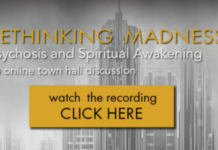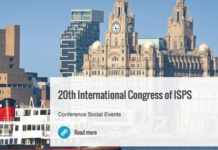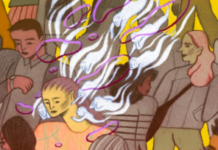Webinar Discussion – Rethinking Madness
A free recording of last week's webinar anchored to Phil Borges' Crazywise, a documentary exploring alternative approaches to mental health, is now available. Over 4,000 people...
Sunday Morning Channel: “Has Psychiatry Silenced God?”
-The Edinburgh International Book Festival hosted a discussion exploring religious beliefs, creative inspiration, and whether hearing "the voice of God" should be regarded as a symptom of mental illness.
NIMH: RAISE Study to Have Immediate Clinical Impact
In a Science Update, the National Institute of Mental Health (NIMH) reports that Medicaid services is already taking steps to implement “coordinated specialty care” (CSC) in response to the RAISE study released last week. “The RAISE initiative has shown that coordinated specialty care for first episode psychosis is better than the standard care offered in community clinics. However, covering the cost of coordinated specialty care can be challenging. When Medicaid agrees to pay for effective treatment programs, patients in need benefit.”
Gradual Tapering is Most Successful for Withdrawal from Antipsychotics
Mixed-Methods study explores the experiences of antipsychotic discontinuation among service users.
“25 Years of Madness and Modernism”: A Review
In this piece for the Centre for Medical Humanities, James Whitehead reflects on the 25th anniversary celebration of the publication of Louis Sass's Madness and Modernism.
"A...
Word Salad is Not “Disorganized Thought and Speech”
This piece for Holistic Elephants discusses the role of social context and environment in our perception and construction of "word salad," a common symptom of psychosis and...
Virtual Reality Promising for Mental Health Treatment
From Healio: A recent review indicated that virtual reality-based treatment may be effective for a variety of mental health concerns including phobias, social anxiety, PTSD,...
The Hearing Voices Movement: Beyond Critiquing the Status Quo
We have just celebrated the anniversary of the rapidly expanding global Hearing Voices Movement which was founded more than twenty-five years ago following the ground-breaking research of Professor Marius Romme and Dr Sandra Escher. Romme and Escher have advocated for a radical shift in the way we understand the phenomenon of Hearing Voices; in contrast to traditional, biomedical psychiatry which views voices as an aberrant by-product of genetic, brain and cognitive faults, their research has firmly established that voices make sense when taking into account the traumatic circumstances that frequently provoke them.
The Elephant in the Room
From Discursive of Tunbridge Wells: Psychologist Rufus May speaks about the often overlooked role of racism in the mental health system. People of color are...
Pledge Support for Changes in Understanding of Psychosis
From Critical Psychiatry: The International Society of Psychological and Social Approaches to Psychosis (ISPS) has produced a 'Liverpool Declaration' stating that psychosis needs to be...
Hearing Voices May Actually Be a Good Thing
From CBS Denver: A new study suggests that people who hear voices may have an increased ability to decode complex sound waves.
"The scientists studied a...
“People with Schizophrenia Hear Voices- Their Own”
For Slate, Eliezer Sternberg outlines research suggesting that auditory hallucinations are actually “subvocal speech” produced by the patient themselves. When a schizophrenic patient hears...
Psychics Who Hear Voices Could Be on to Something
In this piece for The Atlantic, Joseph Frankel compares and contrasts the voice-hearing experiences of self-described psychics and mediums with the experiences of people diagnosed with...
“Hearing Voices: The People Who Say Talking Back is the Only Answer”
Journalist Emma Reynolds profiles Amanda Waegeli, Ron Coleman, Nathan Grixli and Lyn Mahboub about their experiences coming to the Hearing Voices Network (HVN). HVN was established 10 years ago in Australia and provided a support group that encouraged people to listen to their voices rather than trying to block them out. The group now operates in 25 countries.
Becoming a Hearing Voices Facilitator
For three days in December, I was fortunate enough to attend the Hearing Voices Facilitator Training held in Portland, OR. This training expanded my understanding of the voice hearing experience and equipped me with a number of tools to use in facilitating hearing voices support groups. Grounded in a feeling of community, the training was dynamic, emotionally therapeutic, and educational all at the same time – a crystal clear example of how support groups themselves might manifest in the lives of their members.
Psychologists Push For New Approaches to Psychosis: Part 2
The authors of the report expand upon the traumatic and sociopolitical factors underlying presentations of psychosis and “schizophrenia.”
Psychiatrist Asks Field to Drop Schizophrenia Classification
Dutch psychiatrist and epidemiologist, Jim van Os, has renewed his call to drop schizophrenia as a disease classification. “Several recent papers by different authors...
Changing Society’s Whole Approach to ‘Psychosis’
Fifteen years ago this month we were sitting together in the basement of Peter’s house. We had felt a sense of despair at the widespread misinformation and atrocious stereotypes that were dominating media coverage of mental health at the time. We felt that our profession had a responsibility to challenge these stereotypes, and that as psychologists we had something unique to contribute. That was the time when research into the psychology of psychosis was beginning to burgeon, and many of our findings challenged not only the stereotypes but – perhaps more significantly - much ‘accepted wisdom’ within mental health services as well.
Researchers Question Add-On Treatment for ‘Schizophrenia’
A common practice when antipsychotics are found to be ineffective for schizophrenia is to prescribe a second, additional psychoactive medication. Now, a new study suggests that this practice is not supported by the research.
Confusion Over Antipsychotic Dosing Data in RAISE Study
Yesterday, the New York Times reported that schizophrenia patients in an experimental treatment program (RAISE) who experienced better outcomes had been on lower doses of antipsychotics than normal. However, the article published in the American Journal of Psychiatry on Tuesday did not divulge any data on the varying antipsychotic drug doses in the different study groups.
Psychosis and Dissociation, Part 2: On Diagnosis, and Beyond
Recently I wrote an article on MIA entitled Trauma, Psychosis, and Dissociation. Several people responded privately with some very thought-provoking questions that I would like to explore and possibly answer to some extent here. Dedicated readers of the MIA website are all too familiar with the myriad problems that exist with diagnoses in general, the stereotypical (and often untrue) assumptions associated with these various categories, and their lack of scientific validity or reliability. First, though, I want to state that my area of experience and research is with trauma, psychosis, and dissociation . . .
Changing Minds About Voices: Action Over Words
Sometimes the best way to make real change is just to do the work. Sometimes the talk is the work and it can be hard to separate out the two. However, in a growing number of instances, it’s hard to miss the futility of the talking and how tied up we can get in our own virtual war of words. Stepping away can be liberating. Sometimes, while everyone else is wrapped up in the talking, you can get an awful lot done.
The Enduring Myth of the Mad Genius
From Wellcome Collection: It has long been assumed that great writers and artists must be touched by madness. However, no link between artistic talent and...
Specific Early-Life Adversities Lead to Specific Symptoms of Psychosis
Researchers in the U.K. (lead by Richard Bentall) found that specific childhood adversities were significantly associated with specific forms of psychosis in adulthood in...
Minority Discrimination Linked to Psychosis
A study published in this month’s issue of the Social Psychiatry and Psychiatric Epidemiology found that perceived discrimination related to minority status may precede...





















